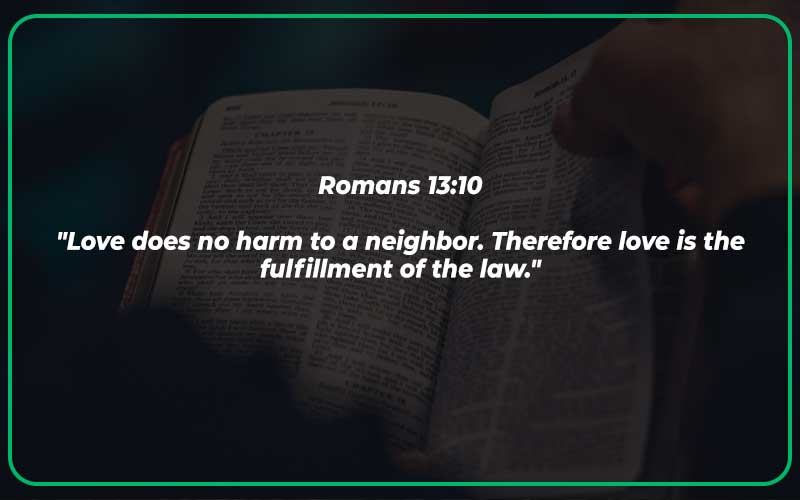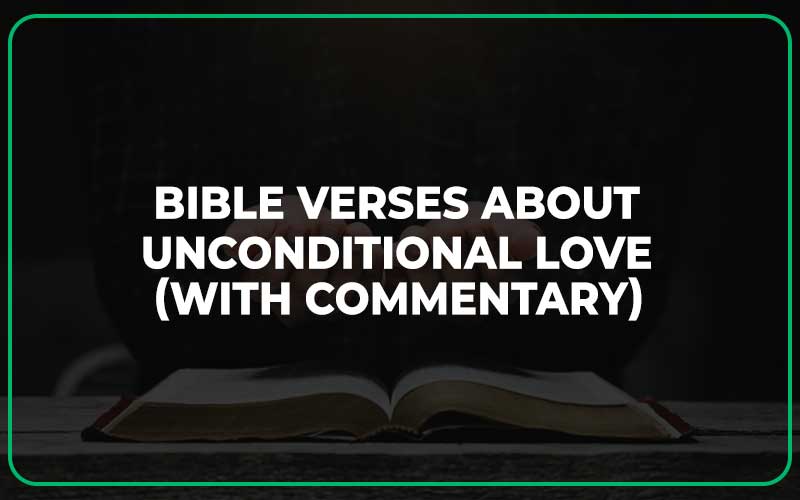The Bible is filled with words of comfort, wisdom, and guidance. One of the most powerful and profound messages found within its pages is that of unconditional love. No matter what we may have done or who we are, God’s love for us remains steadfast and unwavering.
Today, we will explore some of the most beautiful and inspiring Bible verses that remind us of God’s unconditional love for all of His children. So, let us dive in and be reminded of the incredible love that surrounds us.
Bible Verses About Unconditional Love
Romans 8:38-39
“For I am convinced that neither death nor life, neither angels nor demons, neither the present nor the future, nor any powers, neither height nor depth, nor anything else in all creation, will be able to separate us from the love of God that is in Christ Jesus our Lord.”
This verse serves as a powerful reminder that nothing can separate us from the unconditional love of God. No matter what we face in life, whether it be challenges, trials, or even our own shortcomings, God’s love remains constant and unwavering. It reaches beyond the limitations of time and space, embracing us in every situation we find ourselves in. This verse encourages us to place our trust in God’s unchanging love, knowing that we are forever secure in His embrace.
1 John 4:19
“We love because he first loved us.”
This verse emphasizes the source of our ability to love unconditionally. It reminds us that our capacity to love others stems from the love God has shown us first. As recipients of God’s unconditional love, we are called to reflect that love in our relationships with others. It challenges us to imitate God’s love, which knows no bounds and extends even to those who may be difficult to love. By understanding and experiencing God’s love, we are empowered to love others in the same selfless and sacrificial manner.
John 3:16
“For God so loved the world that he gave his one and only Son, that whoever believes in him shall not perish but have eternal life.”
This iconic verse reminds us of the depth of God’s unconditional love. It reveals God’s ultimate act of love – sending His Son Jesus to die for our sins, so that we may have eternal life. The enormity of this sacrifice demonstrates the unparalleled love God has for each and every one of us. It showcases God’s desire for reconciliation and restoration, and His willingness to go to great lengths to ensure our salvation. By believing in Jesus, we can fully experience the profound love of God and receive the gift of everlasting life.
1 Peter 4:8
“Above all, love each other deeply, because love covers over a multitude of sins.”
This verse emphasizes the importance of love in our relationships with others. It encourages us to love one another deeply, not only on a surface level but with a genuine and selfless love. This unconditional love has the power to forgive, heal, and bridge the gaps created by sin and conflict. By cultivating deep love, we create an environment of grace, understanding, and forgiveness. Through this love, we can overcome the mistakes and shortcomings that inevitably arise in relationships, demonstrating the transformative power of unconditional love.
1 Corinthians 13:4-7
“Love is patient, love is kind. It does not envy, it does not boast, it is not proud. It does not dishonor others, it is not self-seeking, it is not easily angered, it keeps no record of wrongs. Love does not delight in evil but rejoices with the truth. It always protects, always trusts, always hopes, always perseveres.”
This famous passage, often referred to as the “Love Chapter,” provides a comprehensive description of unconditional love. It outlines the characteristics and behaviors that exemplify love in its purest form. These verses challenge us to love patiently and kindly, without envy or pride. They remind us to prioritize the needs and well-being of others over our own selfish desires. Unconditional love is not easily angered and forgives rather than keeping a record of wrongs. It embraces truth and protects, trusts, hopes, and perseveres through all circumstances. These qualities demonstrate the selfless and enduring nature of unconditional love.
Matthew 22:37-39
“Jesus replied: ‘Love the Lord your God with all your heart and with all your soul and with all your mind.’ This is the first and greatest commandment. And the second is like it: ‘Love your neighbor as yourself.’
These verses encapsulate the essence of unconditional love. Jesus emphasizes that loving God and loving others are fundamental commandments. Loving God wholeheartedly involves surrendering ourselves to Him and aligning our will with His. Loving our neighbors as ourselves entails treating others with the same unconditional love and respect that we desire for ourselves. Unconditional love is rooted in our relationship with God and extends outward to embrace the diverse and interconnected human family. It serves as the foundation for living out our faith and reflecting God’s love in the world.
Colossians 3:14
“And over all these virtues put on love, which binds them all together in perfect unity.”
In this verse, love is portrayed as the overarching virtue that unifies and binds together all other virtues. It suggests that love is the driving force behind our actions and attitudes towards others. Unconditional love serves as a catalyst for the expression of other virtues such as compassion, kindness, forgiveness, and patience. Love provides the framework for the cultivation of a Christ-like character and fuels our pursuit of authentic and godly living. By putting on love, we demonstrate our commitment to living out God’s love in every aspect of our lives.

Proverbs 10:12
“Hatred stirs up conflict, but love covers over all wrongs.”
This verse highlights the transformative and healing power of unconditional love. It contrasts the destructive effects of hatred, which fosters conflict and division, with the redemptive impact of love. Unconditional love has the ability to cover and transcend wrongs, promoting reconciliation and fostering unity. Instead of harboring bitterness or seeking revenge, love extends grace, forgiveness, and understanding. By choosing to love unconditionally, we contribute to a world that values peace, harmony, and restoration over discord and animosity.
Galatians 5:22-23
“But the fruit of the Spirit is love, joy, peace, forbearance, kindness, goodness, faithfulness, gentleness, and self-control. Against such things, there is no law.”
These verses depict love as one of the fruits of the Spirit, highlighting its essential role in the Christian life. Unconditional love is not something we can manufacture on our own, but rather a manifestation of the Holy Spirit’s work within us. As we yield ourselves to the Spirit, love becomes a natural outflow of our relationship with God. It intertwines with other fruits such as joy, peace, kindness, and gentleness, shaping our character and influencing our interactions with others. Unconditional love reflects the transformative power of the Holy Spirit in our lives.
1 Corinthians 16:14
“Do everything in love.”
This verse encapsulates the all-encompassing nature of unconditional love. It challenges us to infuse love into every aspect of our lives and all that we do. Whether it be our actions, words, or attitudes, love should pervade and guide every decision and interaction. Unconditional love becomes the lens through which we view the world, transforming our perspective and prompting us to seek the well-being and flourishing of others. This verse calls us to align our lives with the greatest commandments of loving God and loving our neighbor, allowing love to be the driving force behind all that we do.
1 John 4:7-8
“Dear friends, let us love one another, for love comes from God. Everyone who loves has been born of God and knows God. Whoever does not love does not know God, because God is love.”
These verses emphasize the intimate connection between God and love. They assert that love has its origin in God Himself, and those who love have been born of God and know Him. Conversely, a lack of love indicates a lack of understanding and knowledge of God. Unconditional love is not simply an abstract concept or a human achievement; it is deeply rooted in our relationship with God. As we encounter and experience God’s love, we are empowered to extend that love to others, mirroring the very essence of who He is.
Ephesians 4:2
“Be completely humble and gentle; be patient, bearing with one another in love.”
This verse encourages us to embody humility, gentleness, and patience in our relationships with others. Unconditional love fosters an attitude of understanding and a willingness to bear with one another. It calls us to embrace the imperfections and shortcomings of others, choosing to extend grace rather than judgment. Unconditional love manifests in our commitment to treating others with kindness, compassion, and respect, even when it is challenging. By imitating Christ’s humility and gentleness, we create an environment of love and acceptance that reflects the character of God.
Matthew 5:44
“But I tell you, love your enemies and pray for those who persecute you.”
This verse challenges us to love unconditionally, even those who are difficult to love or who may actively oppose us. It calls us to transcend our natural inclinations for retaliation or animosity and instead respond with love and prayer. Loving our enemies demonstrates the transformative power of God’s love within us. Unconditional love has the ability to break down barriers, heal wounds, and bring about reconciliation. By choosing love over hate, we reflect the very nature of God and stand as a powerful testimony of His grace and mercy.
Proverbs 17:17
“A friend loves at all times, and a brother is born for a time of adversity.”
This verse speaks to the enduring nature of unconditional love, particularly in the context of friendship and family relationships. It emphasizes the importance of standing by one another through all circumstances, demonstrating love that is unwavering and consistent. Unconditional love extends beyond favorable circumstances and remains steadfast during times of adversity. It supports, encourages, and provides a source of strength and comfort. True friends and family members reflect God’s unconditional love by being present, loyal, and supportive in both joyful and challenging seasons of life.
Luke 10:27
“He answered, “‘Love the Lord your God with all your heart and with all your soul and with all your strength and with all your mind’; and, ‘Love your neighbor as yourself.'”
This verse reiterates the commandment to love God wholeheartedly and love our neighbors as ourselves. Jesus emphasizes the comprehensive nature of love, encompassing every aspect of our being – heart, soul, strength, and mind. Unconditional love entails a total surrender of ourselves to God and an extension of that love to others. It compels us to prioritize our relationship with God and to demonstrate love in tangible ways to those around us. By living out these commandments, we bear witness to God’s love and its transformative power in our lives.
1 Peter 1:22
“Now that you have purified yourselves by obeying the truth so that you have sincere love for each other, love one another deeply, from the heart.”
These verses call us to practice genuine and sincere love for one another. Unconditional love is not merely an outward display, but it stems from a purified heart and a genuine obedience to the truth of God’s Word. It surpasses superficiality and extends to the depths of our beings. Deep, heartfelt love involves investing in the lives of others, seeking their well-being, and choosing to love sacrificially. By reflecting this sincere love, we mirror the nature of God and create an atmosphere of authentic relationship and community.
1 John 4:16
“So we have come to know and to believe the love that God has for us. God is love, and anyone who abides in love abides in God, and God abides in them.”
These verses highlight the inseparable connection between God and love. By knowing and believing in God’s love for us, we come to understand that love is not just an attribute or action of God – it is His very essence. Unconditional love is not just something God does; it is who He is. As we abide in and live out this love, we invite God to dwell within us, and our lives become a reflection of Him. Unconditional love becomes the core of our identity as followers of Christ.
John 15:12
“My command is this: Love each other as I have loved you.”
In this verse, Jesus sets forth the commandment of unconditional love for His followers. He calls us to love one another in the same manner He has loved us. Unconditional love reflects the sacrificial and selfless love demonstrated by Jesus, who laid down His life for us. It is a radical and transformative love that surpasses human limitations and enables us to extend grace and forgiveness to others. By obeying this commandment, we become vessels of God’s love in the world and bear witness to His redemptive and transformative power.
1 Thessalonians 3:12
“May the Lord make your love increase and overflow for each other and for everyone else, just as ours does for you.”
These verses express the apostle Paul’s prayer for the Thessalonian believers – that their love would abound and overflow towards one another and all people. Unconditional love is not stagnant or limited, but it continually expands and overflows. It extends beyond personal relationships to embrace the broader community. As our love increases, we become conduits of God’s love, impacting lives, and transforming the world around us. This prayer encourages us to continually seek God’s empowering love, allowing it to shape and enlarge our hearts for the benefit of others.
Romans 13:10
“Love does no harm to a neighbor. Therefore love is the fulfillment of the law.”
These verses reveal that unconditional love is the fulfillment of God’s law. Love is not arbitrary or sentimental; it aligns with God’s character and purposes. True love seeks the well-being and best interests of others and refrains from causing harm or injury. Unconditional love encompasses all the commandments of God and serves as a guide for ethical and moral living. By loving unconditionally, we honor and fulfill God’s law, bringing glory to Him and displaying His love to the world.

John 13:34-35
“A new command I give you: Love one another. As I have loved you, so you must love one another. By this, everyone will know that you are my disciples if you love one another.”
These verses capture Jesus’ revolutionary instruction to His disciples – to love one another as He has loved them. Unconditional love becomes the identifying mark of true followers of Christ and testifies to the transformative power of the Gospel. It is through our love for one another that the world recognizes our relationship with Jesus. By extending unconditional love to others, we not only demonstrate God’s love to the world but also invite others into a relationship with Him, where they too can experience the incredible depth of His love.
Also Read: 25 Bible Verses About Pain and Suffering (With Commentary)
What does the Bible say About Unconditional Love?
In the Bible, the concept of unconditional love is portrayed as a fundamental aspect of God’s character. It is often described as agape love, a selfless, sacrificial, and unconditional love that seeks the best for others without expecting anything in return. The epitome of this unconditional love is demonstrated through God’s love for humanity.
The most well-known verse illustrating this is John 3:16: “For God so loved the world that he gave his one and only Son, that whoever believes in him shall not perish but have eternal life.” This verse emphasizes the depth of God’s unconditional love for all people, regardless of their shortcomings or mistakes.
Additionally, 1 Corinthians 13 is often referred to as the “love chapter.” It describes the characteristics of love, highlighting qualities like patience, kindness, forgiveness, and the lack of self-seeking. This chapter encourages us to practice unconditional love in our relationships with others, mirroring the love that God has shown to us.
Throughout the Bible, various stories and teachings illustrate unconditional love. For instance, the parable of the prodigal son in Luke 15:11-32 portrays a father’s unwavering love for his wayward son, welcoming him back with open arms despite his mistakes. This narrative reflects God’s forgiving and unconditional love toward His children.
As we seek to understand and emulate this unconditional love, we are encouraged to love one another genuinely, without conditions or expectations. It involves showing compassion, forgiveness, and kindness to everyone, reflecting the divine love that the Bible teaches us.

